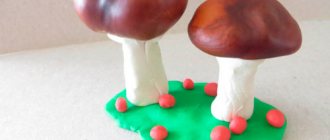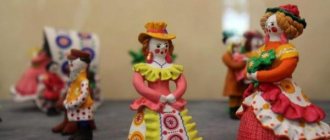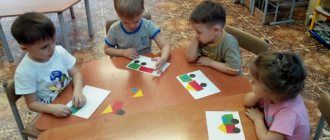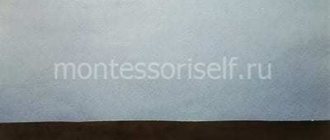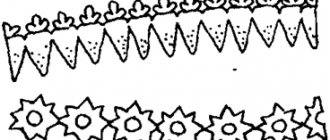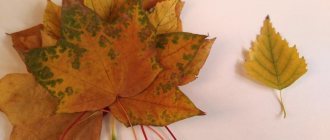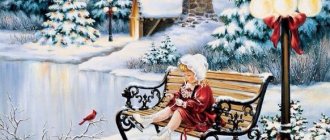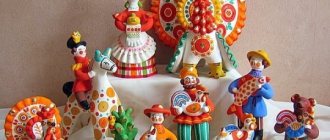Button applique ideas
All children love buttons. Probably, every child more than once found his mother’s box with them and put things in order in it, choosing the ones he liked the most. Therefore, an applique with buttons will be interesting to any child.
Button tree
From the age of two, a child can already make a simple picture by gluing buttons in the shape of a flower or a butterfly to the base.
With older children, you can make a hot stand by gluing buttons to leather or a piece of felt.
Button bugs
With older children, buttons can be glued with glue, but when working with little ones, it is better to glue double-sided tape to the buttons. If there are a lot of them and there is no way to stick tape onto each one, you can glue plasticine onto the cardboard, and then press the buttons onto it. It is better to use glossy cardboard, because... stains from plasticine may appear on the matte finish.
Elephant made of buttons
Car
Button painting
Paper applique
Applique - Cat in the meadow
Most often, when we talk about applique with children, we mean paper applique. And this is not just so, because paper can be found in any stationery store, and the variety of its types is quite large.
- The paper is bright and colorful, which really attracts the child to work with it.
- It can be of different textures and shapes
- It is easy to roll, fold, cut out any shape from it and glue it to a paper base
- Well, the most important thing is that paper is an environmentally friendly and, accordingly, safe material, therefore it is great for creative activities even with the smallest children
Concept and origins of appliqué
In English, the word “application” sounds like “application”. One of its many meanings is “application”. This term is used in various spheres of human activity when they want to talk about applying or imposing something on some basis.
Both in arts and crafts and in the industrial production of household items, applique is made from various materials: paper, wood, bone, horn, leather, metal, glass, dried plants (natural materials), fabric and the like.
One of the most ancient and widespread activities is applique from textile materials. England is considered the birthplace of textile appliqué. But it is more likely that different peoples have used it since ancient times, because applique is a simple, relatively inexpensive and expressive means of decorating clothes and home.
Napkin applique ideas
For applications, you can use even the most ordinary napkins. They come in different colors, although their choice is not large; as a rule, these are primary colors and several additional shades. This technique is very simple and can be done even with three-year-old children.
Napkin applique pattern
Applique using napkin balls is a very exciting activity for children. This technique stimulates the development of fine motor skills well, because... Rolling balls is a very painstaking job.
Making this craft is quite simple:
- prepare the drawing, apply it to the base
- the details of the drawing should not be small, there must be enough space for gluing the balls
- you will need PVA glue and scissors
- prepare colorful napkins
- select the size of the frame to frame your finished work
Napkins can also be replaced with corrugated paper, but this is not necessary, because... You can find these napkins in any store. The only thing better than corrugated paper is the wide variety of colors.
Fish
The drawing can not be applied to cardboard, but printed on a printer and glued to the base. While it is drying, you need to prepare multi-colored balls.
To do this, cut napkins or corrugated paper into squares of the same size and roll them into balls. For such work you will need a lot of balls, and their number will also depend on the size of the picture and the size of the balls themselves.
Swan
Using PVA glue, napkins need to be glued to the picture, some details can be drawn with a marker or felt-tip pen, it all depends on your imagination and the desire of the young master.
The background of the work can also be made from balls of a suitable color.
Craft for February 23
Frame your work and use it to decorate a room or other room in the house or garden. Such a picture will also be a good gift for relatives and loved ones, for example, on the holiday of February 23 or March 8.
Circle applique ideas
An unusual applique idea is to use only cut out paper circles. If you make all the details from circles, you will get a very interesting and unusual work.
The child will really like this activity, especially if he sees how simple circles of different sizes turn into a cute cat or bird.
Owl and fish
Crocodile
Ladybug and penguin
Birds
Cereal application ideas
Cereals can be successfully used not only in the kitchen, but also in creativity. Cereals make wonderful and unusual paintings and crafts.
Just like with the napkins, you'll need a base image. This can be any image drawn, printed or cut out from a coloring book. The main thing is that there are no small details in the picture, then its elements can easily be covered with different grains.
Millet chicken
- Apply glue to the picture with a brush. If you will use different grains, do not apply glue to the entire drawing at once.
- First coat one part with glue and let the child sprinkle cereal on it. You can use your fingers to press it slightly onto the base. Anything that doesn’t stick, shake it back into the plate.
- If there are several elements, apply glue to them and sprinkle with cereal one by one - this will help make the work neat
Turtle
Croup can be used in a wide variety of ways, and you can even paint it in different colors with gouache. And it's very easy to do:
- dilute the gouache with a little water
- paint the cereal with a brush
- place on a bag or stationery file in one layer
- let dry
Cheburashka
The second method is suitable if you need to color a lot of cereals, and it is good because the colored grains do not dirty your hands when you work with them further:
- Place the cereal in a container, rice works well
- fill it with water and add enough gouache to get a bright, rich color
- leave to stand for 12 hours
- drain the water and dry in one layer
Giraffe
The influence of applique classes on the development of a child
Thanks to the application, children gain the following skills:
- master movement coordination
- develop fine motor skills of the hands
- learn the basics of composition
- learn colors and how they can be combined
- study different textures
- develop observation and imagination
- learn to fantasize
Appliqué work promotes the development of a child’s thinking processes; he learns to analyze and compare real objects and animals with crafts made with you. A child, working with an applique, makes a whole from several parts and learns to divide the whole into components.
Application with pasta and beans
- Like any other type of creativity, applique helps the development of speech, when adults discuss with the child the crafts they create, explain what they are doing and why, and what the end result is. By working together, children engage in dialogue and increase their erudition
- And of course, this is a good option for spending time together with your child, which will help you establish and strengthen emotional contact.
- Below we offer you ideas for crafts using the applique technique. The proposed examples vary in complexity and require varying amounts of time to create. Therefore, choose works according to the child’s age and help him create them.
- It will be good if you invite your child to change the composition, come up with something of his own - this will help him develop his imagination and creative abilities
Technology Basics
Applique is one of the types of fine art techniques. It consists of cutting out the details of the future image, placing them on a base taken as the background, and securing it.
Applique is a very ancient art.
Previously, it was used to decorate clothes, shoes, homes, and horse harnesses. The appliqué was made from various materials: it was usually made of leather, fur, felt; later they began to use cloth; The main applique is considered to be paper applique.
The application is very easy to use. The image retains its realism. Thanks to this, this design can be used to decorate paintings or ornaments.
The main features of the applique are that it is distinguished by its silhouette.
Applique elements can be flat or three-dimensional. To add volume, before attaching to the base, bulky material is placed under the appliqué parts.

